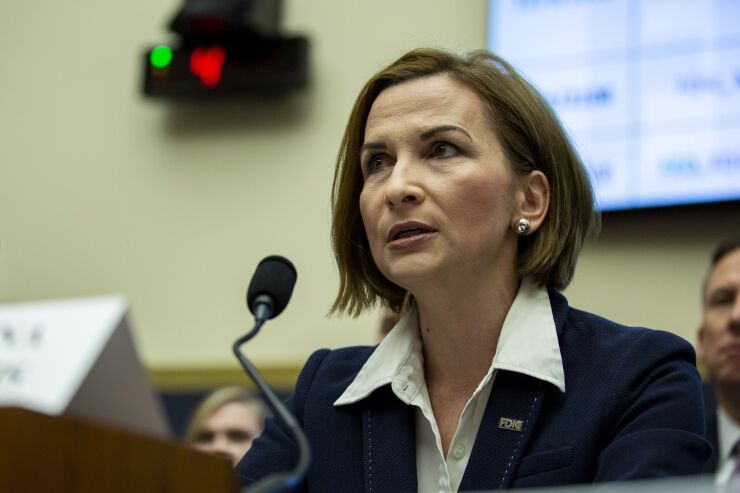WASHINGTON — The chairman of the Federal Deposit Insurance Corp. asserted a broad interpretation of her powers over the agency’s board on Wednesday, pushing back on reports that an incoming Democratic majority may be able to enact policy without her support.
Speaking at the American Bankers Association’s virtual Washington summit on Wednesday, FDIC Chairman Jelena McWilliams said she looks forward to whoever President Biden taps to lead the two regulatory agencies whose directors have seats on the FDIC board, the Office of the Comptroller of the Currency and the Consumer Financial Protection Bureau.

But McWilliams also sought to dismiss reports that once confirmed, Democrats on the FDIC board — who will then hold a majority of votes — may be able to push policy without her support using a
“There has been some confusion about what the board can and cannot do,” McWilliams said, responding to a question from ABA President and CEO Rob Nichols about the board’s political dynamics and the potential for directors to “force a vote on something.”
“With respect to the board agenda, the chairman really controls the board agenda — that's something that, frankly, has been a little bit misinterpreted in the last couple of months — as well determines what agenda items come to the board,” McWilliams said.
The comments mark the first time McWilliams has publicly asserted her control over the board and its agenda in response to a hypothetical Democrat power play.
The FDIC chair has long been understood to set the agenda of the agency, determining what items and policies the board can vote for in a given meeting. That left analysts with
In January, however, American Banker reported that some Democrats were weighing the use of a “special meetings” clause within the FDIC’s bylaws, which would allow two FDIC board members to request a board meeting without the chairman’s support.
While some analysts argued that such a maneuver could be used to put Democratic policy up for a vote, the special-meetings clause has never been used as a policymaking apparatus, and FDIC staff have repeatedly argued that the chairman would still retain control over the agency's agenda.
Without historical precedent, it is difficult to predict how such a board conflict would be resolved, if it occurs.
Biden has
McWilliams, for her part, said she suspects that whoever is appointed "will have the best interest of the FDIC in mind."
She added that she hopes the new heads of the CFPB and OCC "will be open to considering ways in which we can enable banks to work with their communities."





